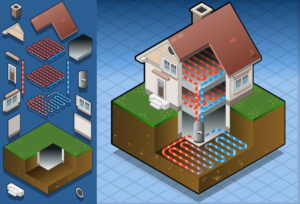We are proud to offer geothermal heating and cooling in Greenville, SC and the surrounding areas.
Now, if you read that and wonder why “cooling” was included with “heating,” then this is the post for you. It’s a common misunderstanding with geothermal HVAC systems that they provide heat only. After all, they have “thermal” right there in the name and they operate by accessing heat coming out of the Earth itself. Why would they have the ability to cool?
We’re going to get into why geothermal HVAC not only cools as well as heats, but offers better cooling and heating than many standard air conditioners and air-source heat pumps.
The Ground-Source Heat Pump
A geothermal HVAC system is also known as a ground-source heat pump. This separates it from an air-source heat pump, which is how conventional heat pumps and air conditioners work. Air-source heat pumps draw on the thermal energy they need from the air outside. A ground-source heat pump instead draws on the heat from beneath the ground, usually 10 feet below the frostline.
Now that we’ve got that established, let’s look at the air-source heat pump in operation. This heat pump delivers heating by drawing on the available thermal energy in the air outside, moving it indoors to release it. When in cooling mode, it draws heat from the indoor air and moves it outside, which cools down the air indoors.
It’s not much different with a ground-source/geothermal heat pump, except that the heat pump is either drawing heat from the ground or moving heat into the ground. So when a geothermal heat pump is in cooling mode, it uses the ground as its heat sink, pulling heat from the indoor air and depositing it into the earth.
Why Geothermal HVAC Is Very Good at This Job
Now we know that a geothermal HVAC system uses the ground the same way a heat pump or AC uses the air: as a heat exchange medium. This is a more effective and efficient way of handling heat exchange for a simple reason—the temperature of the ground 10 feet below the earth remains relatively stable no matter the temperature above ground. The temperature mostly hovers around 55°F. This is advantageous for both heating and cooling.
- In heating mode, the heat pump never needs to struggle to find enough heat to bring indoors. Air-source heat pumps suffer declines in energy efficiency if the temperature drops below freezing. A ground-source heat pump never faces this problem.
- In cooling mode, an air-source heat pump must push heat out to an already hot place, the air on a summer day. A ground-source heat pump has it easier because it’s pushing heat into a relatively cool 55°F no matter how hot the day is.
All around, geothermal HVAC systems have higher energy efficiency performance than standard heat pumps—often 4 to 6 times more efficient. This not only makes geothermal HVAC less costly to run, but it also helps to benefit the environment with the reduced electrical demand. Plus, the ground loops for geothermal heat pumps can last for more than 50 years.
Contact Carolina Climate Control to learn more about geothermal heating and cooling. The Moose Is Loose in Your Neighborhood!

